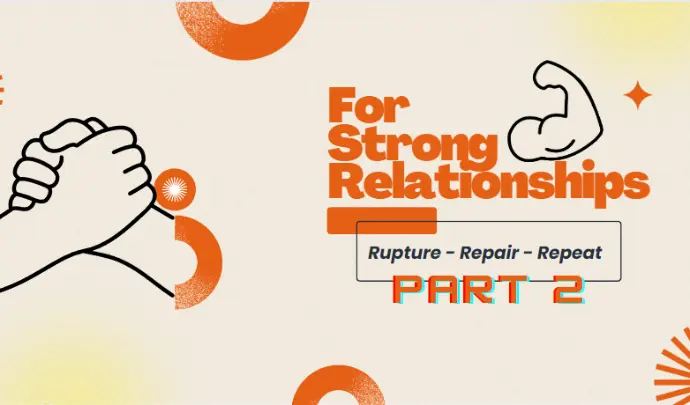Intro
If you are just stumbling into this blog and did not read the one from last week dated 2.22.24, please go check that one out first. In that blog we considered the process of rupture and repair in the development and strengthening of relationships. Ruptures (think conflict, disagreement, misunderstanding, etc.) will happen in every relationship. Knowing how to repair the ruptures results in stronger relationships and in you personally gaining more confidence in yourself and in other relationships.
My Thoughts
Along with the hints suggested in the last blog, one important hint is that ruptures should be repaired as quickly as possible. The reason that this is true is that we tend to ruminate on ruptures when they occur. We replay the rupture in our mind. We imagine what we should have or could have said. We tell ourselves stories of what the other person meant or thought or felt. We play out scenarios in which we “tell him what I really think!” the next time we talk to the person. We all do this.
The problem is that the longer you think about a conflict in your mind, the more strong emotions are stirred up and the stronger, and more entrenched those emotions become. Perhaps you have experienced something like this in a relationship: You are really mad at someone and think about it for days. Then a week later you find out that the story you were telling yourself about the person and the relationship was actually wrong! If you would have talked to the person right away, you would not have ended up with the anger and bitterness that you spent a week thinking about.
One of the things that our brains do naturally is come up with stories to explain what happens in our lives. We need to make sense of things in order to navigate life. We don’t do well in perpetual chaos! It’s no different with ruptures. We have to make sense of the emotional hurt we experience in a relational rupture. So we tell stories based on what we think happened or what someone else thinks happened or even that justifies our anger.
Conclusion
Here is the key question when you start telling a story about a relational rupture you experience: Is the story I am telling myself true?
Almost always, the only way to know for sure is to talk directly to the person. And the sooner you talk to the person, the sooner you can know. And the less time you will spend telling a false story that leads to bigger anger and bitterness. Repair ruptures ASAP. You will save yourself a lot of wasted emotional energy!
A couple of thoughts.
- Depending on the nature of the rupture, having a third person you both trust to sit with you as a kind of mediator can help emotions from getting out of control.
- Repairing ruptures happens best with listening, not telling. Take responsibility for your part. Listen to the other person’s part - without interrupting.
- Assume positive intent. Few people set out to rupture relationships on purpose. Assuming positive intent, or at least neutral intent, allows space to truly hear the other person’s story. Most people are not “out to get you.” And you probably aren’t friends with any that are!
- Strength in relationships grows when ruptures are repaired and there is a change on the part of both people. As with last week, some relationships are not healthy and if a person continues to do the same kinds of things that lead to rupture without any real changes in their behavior, it may be a relationship “beyond repair.” Talk to a trusted friend or mentor about this if you suspect it to be true
